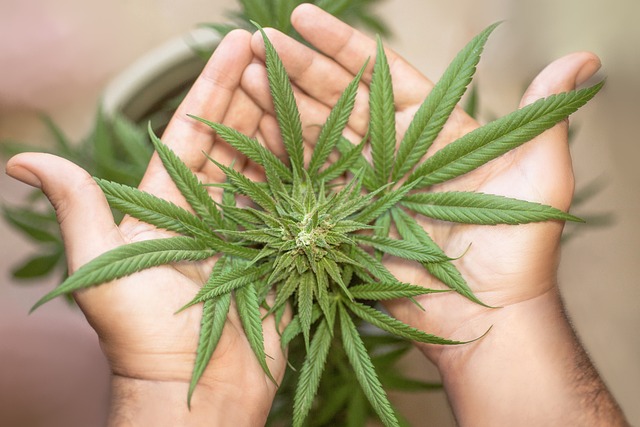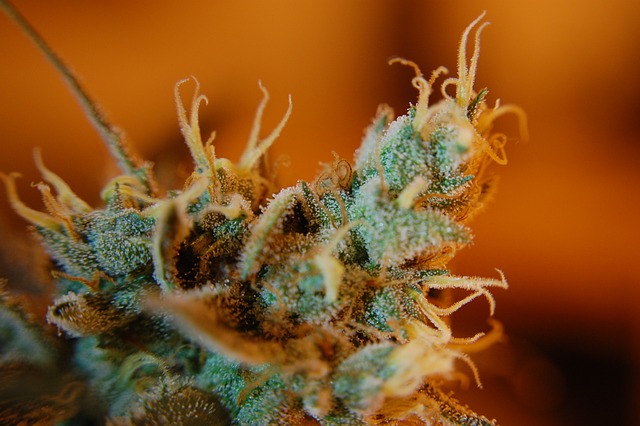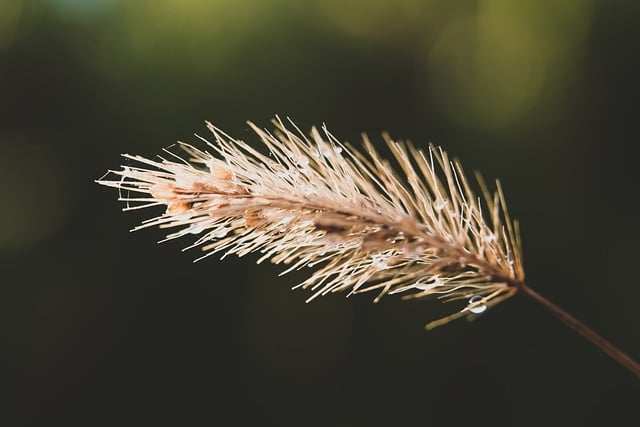In New York, the legal landscape for THCA, a non-psychoactive cannabinoid found in cannabis plants, has undergone significant transformation with the passage of key legislation such as the Compassionate Care Act of 2014 and the Adult-Use Cannabis program. These measures were further solidified by the Marihuana Regulation and Taxation Act (MRTA) in 2021, which decriminalized cannabis and set a comprehensive regulatory framework for its use and taxation. As a result, THCA is now legal for medical use within New York state, with certified patients gaining access to THCA flower from licensed dispensaries. The MRTA marks a progressive step in the state's approach to cannabis policy, indicating a commitment to responsible management of both medical and adult-use cannabis. THCA's therapeutic potential, including its anti-inflammatory, antiemetic, and neuroprotective properties, is under scientific investigation, positioning it as an alternative to THC for those seeking the health benefits of cannabinoids without psychoactive effects. As research continues and acceptance grows, THCA is set to become a significant addition to wellness routines, with New York at the forefront of its utilization and regulation.
Exploring the nuanced effects of THCA (Tetrahydrocannabinolic Acid) flower, this article delves into its burgeoning presence within the legal landscape of New York. As a non-psychoactive variant of cannabis, THCA has garnered attention for its potential therapeutic benefits and its role in various wellness regimens. However, it is crucial to understand the breadth of its side effects, from respiratory and digestive impacts to neurological considerations and dermatological reactions. This piece examines these aspects, offering insights into how THCA flower interacts with prescription medications, the influence of dosage on user experience, and the long-term health implications. With a focus on safety and efficacy relative to other cannabinoids, we also explore the regulatory framework that governs its use in New York, ensuring readers are well-informed about this unique compound’s legal status and market availability. Best practices for safe consumption and the future of THCA research conclude our comprehensive overview.
THCA Flower and Its Legal Status in New York

In recent years, the legal landscape regarding cannabinoids has evolved significantly. THCA, or Tetrahydrocannabinolic Acid, a non-psychoactive precursor to THC found in the Cannabis sativa plant, has garnered attention for its potential therapeutic properties. In New York, the regulatory framework surrounding cannabinoids has undergone substantial changes with the passing of the Compassionate Care Act in 2014 and subsequent updates, including the Adult-Use Cannabis program. As of early 2023, THCA flower remains a legal entity within New York’s medical marijuana program for certified patients. The state’s legislative changes have paved the way for broader adult-use cannabis legislation, signified by the Marihuana Regulation and Taxation Act (MRTA) passed in March 2021. This act not only decriminalized cannabis but also set a framework for the taxation and regulation of its sale, marking a significant milestone in the state’s approach to cannabis policy. However, it’s important to navigate these changes carefully, as the legal status of THCA flower can vary depending on its intended use, whether for medical purposes under a doctor’s recommendation or within the adult-use framework once fully implemented. Users in New York should always ensure they are compliant with state regulations and licensed dispensaries when acquiring THCA flower to avoid potential legal complications.
Understanding THCA: A Non-Psychoactive Cannabinoid

delta-9-tetrahydrocannabinolic acid (THCA) is a naturally occurring cannabinoid found in the Cannabis sativa plant, which has garnered attention for its potential therapeutic properties without the psychoactive effects associated with its more well-known counterpart, THC. As of recent legislation updates, THCA products are legal in New York for medical use, and certain derivatives and isomers thereof have been decriminalized, opening up new avenues for research and therapeutic applications. Unlike THC, which alters a person’s mental state, THCA interacts with the body’s endocannabinoid system in a way that does not induce intoxication. This has made it an area of interest for individuals seeking the potential benefits of cannabinoids without the mind-altering effects. Preliminary studies suggest that THCA may possess anti-inflammatory, anti-nausea, anti-emetic (anti-vomiting), and neuroprotective properties, making it a subject of ongoing research for various health conditions. In New York, where the legal landscape is evolving, consumers and healthcare providers are increasingly exploring the benefits of THCA, which aligns with the state’s progressive stance on medical cannabis use. As awareness and acceptance grow, the potential for THCA to become a staple in wellness routines, both within New York and beyond, seems promising.
In conclusion, the exploration of THCA flower’s legal status in New York and its characteristics as a non-psychoactive cannabinoid has highlighted the nuances within cannabis legislation and the potential benefits of this compound. As the legal landscape continues to evolve, understanding THCA’s effects and its distinctions from other cannabinoids becomes increasingly important for consumers and regulators alike. For those interested in the therapeutic properties of cannabis without the high associated with THC, THCA flower may offer a promising alternative. It is clear that ongoing research will further elucidate the role of THCA within the realm of wellness, particularly as it pertains to New York’s evolving laws regarding its use.
